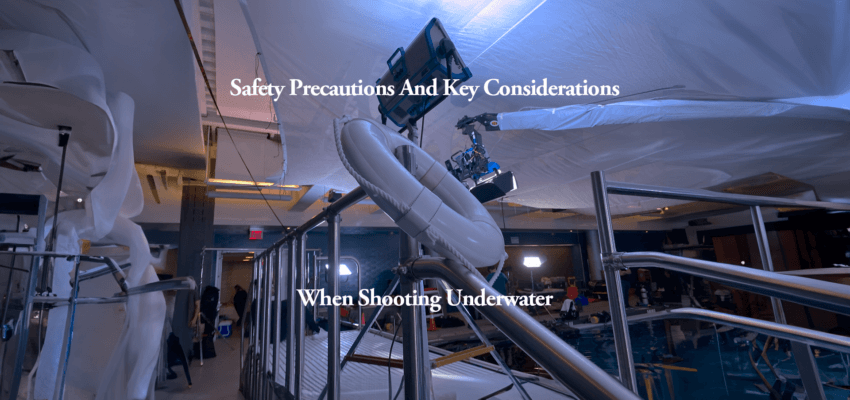Shooting underwater may seem simple on the surface, but diving deeper uncovers the many challenges experts face in this environment. From pacing and shot list to communicating underwater and handling equipment, precautions should be taken to ensure the well-being of the cast and crew. This post explores the safety challenges encountered in underwater shooting and provides key considerations when deciding to hire an expert.
The Importance of Safety in Underwater Shooting
While there are many challenges associated with this type of shooting, safety is one of the biggest priorities of an underwater camera operator. Below are some safety considerations to keep in mind:
Pacing
Everything slows down when water is involved:
- Normal tasks take longer to complete.
- Direction takes longer to incorporate.
- Shots take longer to shoot.
Preparing for this ahead of time greatly impacts a production’s success. Reducing the shot list and organizing it in an efficient manner is key.
Environment
Being immersed in a pool or open water for extensive periods of time can be dangerous. Fatigue must be considered while shooting underwater. A lifeguard is required to be on set. A safety diver accompanies the cast and crew in the water at all times. In open water, there are infinite variables to consider: bad weather, strong currents, reduced visibility, marine life, etc. Since the camera operator and safety diver understand the intricacies of the underwater environment, they are able to recognize the limits of everyone involved. They know when it’s time to stop and start again to protect the cast and crew.
Communication
The camera operator works closely with talent to fulfill the director’s needs. Breaking down direction into actions that are easier to accomplish in the water requires expertise and efficiency. Using an Underwater PA System helps with communication. This brings clarity to talent, allows for production to move at a steady pace, and reduces time spent in the water. To further streamline production, the camera operator uses hand signals to communicate with the camera technician above water. This enables the technician to quickly relay the status of the underwater environment to the rest of the crew.
Handling Equipment
Diver training and certification is required to use scuba gear for underwater shoots. If a camera operator attempts to shoot underwater without proper certifications, they are prohibited from using air from scuba tanks. They must hold their breath for extended periods of time and come to the surface after each shot. This not only slows production but also puts the cast and crew in jeopardy.
The Benefits Of Having An Expert On Set
There are many advantages of hiring experts who understand the ins and outs of shooting underwater. Among them are adaptability, efficiency, order, and trust.
Adaptability
Experts who are well acquainted with the challenges of underwater shooting are highly adaptable. While they have the foresight to know what will work before starting, they also know how to pivot if something is not going according to plan. Due to their experience, they are attuned to intricate details and can easily solve problems on set.
Efficiency
Ambition can lead to a filmmaker’s demise if they are inexperienced with the underwater environment. An overabundance of shots that are not feasible for the environment is dangerous for anyone in the water. An expert understands what shots are practical, how to prioritize and execute the shots, and how to achieve them in the least amount of time possible.
Order
When an expert is present, the chaos that arises due to a lack of prioritization,execution, and time management disappears. Procedures are in place, steps are followed, time is used efficiently, and everyone does their best work.
Trust
Experts allow productions to run smoothly and create a safe environment for the cast
and crew.
The camera operator knows how to:
- maneuver to get the desired shot
- Safety Precautions And Key Considerations When Shooting Underwater4make talent feel comfortable in the water
- communicate effectively to guide the production toward success
Exploring Depths Safely and Creatively: “On Duty” Case Study
In 2022, Air Sea Land had the privilege to work on a short film called “On Duty.” Boulder Crest Foundation” commissioned by Neymarc Visuals to develop a TV commercial and brand film to raise awareness about their post-traumatic growth programs, which help veterans, law enforcement officers, and first responders overcome post-traumatic stress through growth-focused programs.
As with all underwater shoots, we planned and prepared ahead of time.
On shooting day, we held a safety meeting, blacked out the pool quickly, set up PA systems for easy communication, and lit the set. We secured a light to the end of a jib to create the illusion of a moving sun. We established a safe set for the cast and crew by organizing equipment and cables meticulously.
Production allowed us to lead, which resulted in a smooth production process, finishing ahead of schedule, a happy director, and wonderful final results.
Charting New Depths
Safety Precautions And Key Considerations When Shooting Underwater5Prioritizing safety in the world of underwater shooting is paramount. Trusting in experts guarantees smooth, well-executed productions and creates a secure environment for all involved.
With over 30 years of experience, Air Sea Land offers efficiency, expertise, and specialized equipment, ensuring a confident navigation through the depths. If you need an expert for your next underwater project, we can help you overcome hurdles and ensure the success and safety of your production.
If you want to learn more about the common challenges that underwater operators face and best practices to be aware of, check out our article “Shooting Underwater: What To Know Before You Dive In.”
Don’t hesitate to reach out to us for professional services or further assistance!



